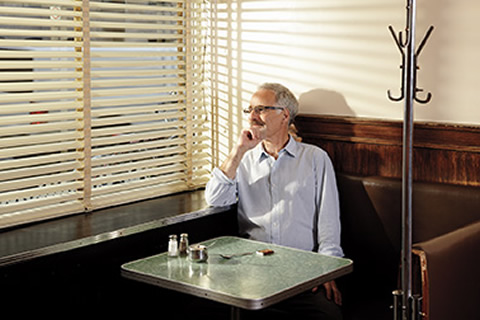When Marc Lewis got his first term paper back as a graduate psychology student at the University of Toronto, he was shocked by his professor’s first comment: I wish there were a grade beyond A+. All he could say in return was: “Are you sure?”
Lewis, you see, was hardly a typical “A” student. At the time, he had only recently concluded a 15-year battle with drug addiction – a struggle that cost him his job, his reputation, his girlfriend and his first shot, years earlier, at a graduate degree. It also got him arrested more than once, for crimes ranging from marijuana possession to drug theft from medical centres.
By the time he turned 30, Lewis’s nightmare finally ended and his demons have remained vanquished to this day. After going on to complete his PhD at U of T in 1989, he stayed in Toronto and embarked on a long career as a developmental psychologist and neuroscientist. Now, he has drawn on both experiences – squandered youth and triumphant adulthood – to write a compelling new autobiography, entitled Memoirs of an Addicted Brain.
In it, he takes the reader from his first sip of alcohol as a depressed teenager in the mid-1960s, through to experiments with hallucinogens in California, as well as nitrous oxide and opium in Asia. “There was so much to try,” he says of that famously psychedelic era, “and I was pretty adventurous.” But the ’60s gave way to the ’70s, and Lewis more than succeeded in painting them black. Memoirs culminates in a shameful denouement, as the aspiring psychologist embarks on a series of drug thefts – from labs in Toronto to medical centres in Windsor and Thunder Bay, Ontario. His last theft resulted in a conviction with a year’s probation.
In the end, Lewis learned what all addicts eventually do – that “you have to go through a certain amount of suffering before you’re ready to stop.” He sat at a table, wrote the word NO on a piece of paper and took care to look at it many times a day. During the few years that he was fighting his addiction, he worked a series of odd jobs back in his native Toronto. Lewis eventually felt emboldened to renew his studies, becoming an expert in the emotional development of troubled children and adolescents. “There’s something raw and honest about emotions, which attracted me to studying them,” he says. “They’re so powerful, and they drive many aspects of how our minds work.”
A brief stint doing clinical work gave way to a career-long concentration on teaching and research; eventually, Lewis turned his attention to neuroscience. Indeed, what sets his book apart from other drug memoirs is its fascinating explanations of what various drugs actually do to the brain. “I have a very strong interest in the neuroscience of addiction,” he says. “I understand a lot about it both from my own personal experience and from all the research I did for the book. Because of that, I think I can be very creative and clever about how to study addiction.”
Now 60, Lewis is retired from U of T and works part time as a professor in Holland. He lives with his third wife and their five-year-old twins, and hopes that his tale might serve as a warning and inspiration to others grappling with this most destructive of human behaviours. “There’s not much point in studying addiction if you’re not going to learn something that will help people to deal with it.”
Recent Posts
U of T’s Feminist Sports Club Is Here to Bend the Rules
The group invites non-athletes to try their hand at games like dodgeball and basketball in a fun – and distinctly supportive – atmosphere
From Mental Health Studies to Michelin Guide
U of T Scarborough alum Ambica Jain’s unexpected path to restaurant success
A Blueprint for Global Prosperity
Researchers across U of T are banding together to help the United Nations meet its 17 sustainable development goals







3 Responses to “ Life Recovered ”
I just came across this article as I was searching for any support groups that may be on campus for recovering alcoholics/addicts. I am in my first year working towards majoring in Women and Gender Studies. I am a recovering alcoholic as well and found this article to be very inspiring!
Thank you for sharing this story
@Danijela Here are some suggestions of where to turn on campus for assistance with alcohol and addiction issues:
Call the university's counselling and psychological services office at 416-978-8070 to book an assessment.
Call the Centre for Addiction and Mental Health Support Line at 416-595-6111.
Call the Gerstein Line at 416-929-5200.
Thank you for the info. I was looking more for support groups amongst the students than for outside resources. The info is appreciated anyway. This article is a perfect example of what is capable. :)